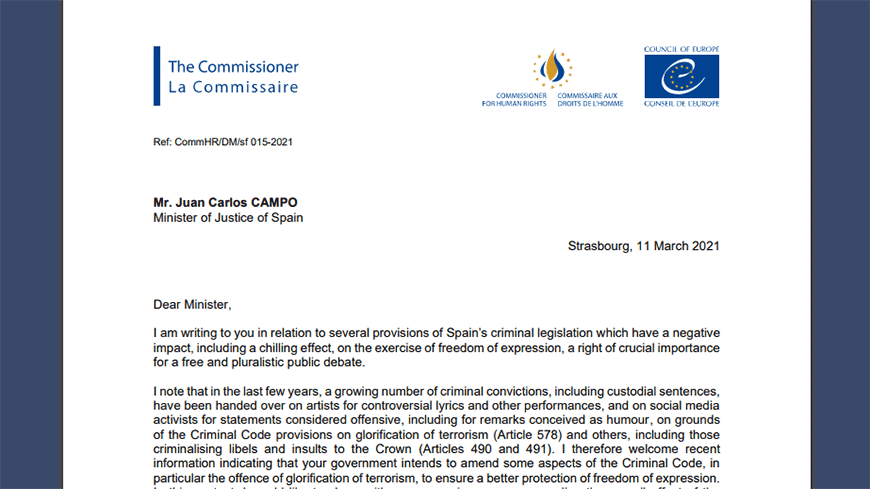В опубликованном сегодня письме, адресованном Министру юстиции Испании, Комиссар Совета Европы по правам человека Дуня Миятович призывает власти Испании внести необходимые поправки в Уголовный кодекс, которые укрепят существующие гарантии для всесторонней реализации права на свободу выражения мнений и поспособствуют тому, чтобы суды принимали свои решения в полном соответствии со статьей 10 Европейской конвенции о правах человека.
Далее на английском языке.
She notes that a growing number of criminal convictions, including custodial sentences, have in recent years been handed over on artists for controversial lyrics and other performances, and on social media activists for statements considered offensive on grounds of several Criminal Code provisions, in particular provisions on glorification of terrorism and on libels and insults to the Crown.
The Commissioner expresses concerns about the lack of clear definition of some of the notions enshrined in the provision on glorification of terrorism and recalls the potential danger posed by the use, in anti-terrorist legislation, of catch-all labels and of broad and insufficiently defined offences which may lead to unnecessary or disproportionate restrictions to the right to freedom of expression.
She also notes that some Spanish courts decisions have failed to adequately determine whether the glorification of terrorism really entailed the risk of a real, concrete and imminent danger or have interpreted the notion of intent of the perpetrators in an abstract manner. In this context, the Commissioner reiterates that anti-terror legislation should only apply to content or activities which necessarily and directly imply the use or threat of violence with the intention to spread fear and provoke terror.
Regarding the provisions of the Criminal Code criminalising libels and insults to the Crown, the Commissioner stresses that the possibility of imposing restrictions on freedom of expression in the context of political debate are very limited, in particular when it comes to politicians, representatives of the authorities and other public figures. She urges the authorities to use the implementation of relevant judgments of the European Court of Human Rights as a basis for bringing the Criminal Code fully in line with the Court’s caselaw under Article 10 of the ECHR.
The Commissioner also calls on the Spanish authorities to restrict the application of provisions related to hate speech to cases prohibited under international human rights law, that is to expressions of hatred based on xenophobia, antisemitism and other forms of hatred based on intolerance that constitute incitement to discrimination, hostility or violence. Lastly, she calls for a decriminalisation of defamation and of the offence of insults to religious feelings to prevent their possible chilling effect on freedom of expression.



